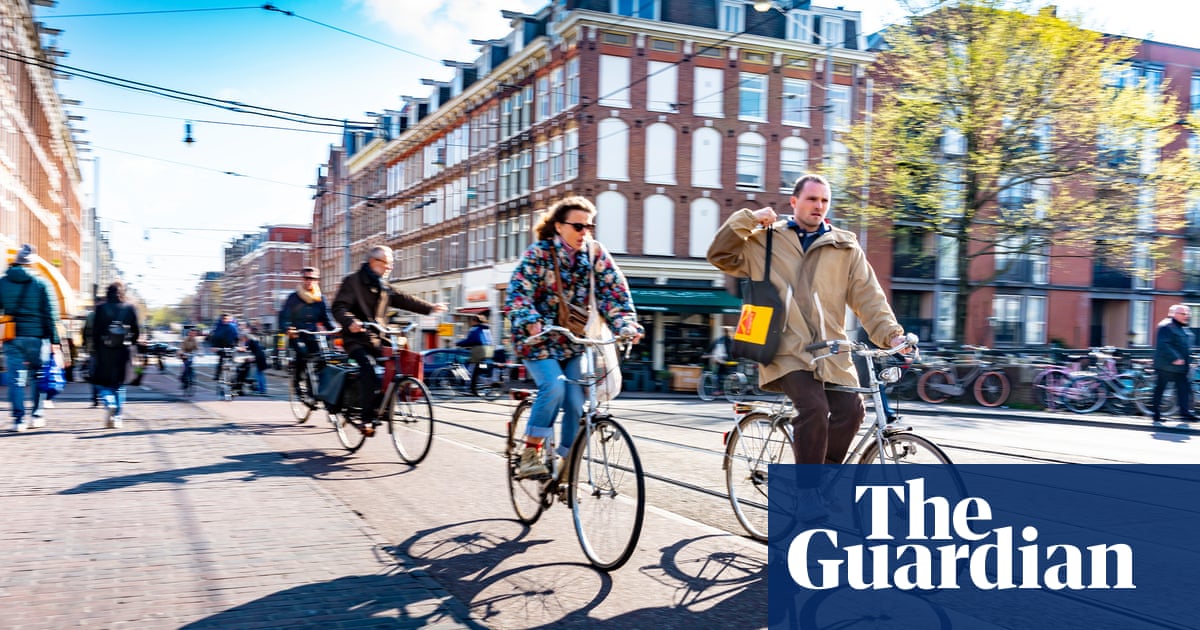When 42-year-old Myrthe Boss gets on her bike to go shopping in the Dutch town of Ede, she pops on a helmet. This act, considered essential in many countries, marks Boss out as something of a radical in the Netherlands, where helmet-wearing is rare.
Now, however, faced with rising number of traffic deaths linked in particular to older riders and e-bikes, the Dutch government and provinces – not to mention neurologists like Boss – are pushing for cyclists to think again.
“I’m a huge fan of cycling but it’s important to protect ourselves,” Boss said. “The brain is a very vulnerable organ with limited capacity to recover. If you fall from a bike and sustain a brain injury, this has long-term consequences. And a large proportion of people who fall while cycling have brain injury.”
She knows this all too well: in 2019 her mother died after a collision with a car at a roundabout. “A helmet doesn’t prevent everything but it does ensure there is less impact from the street on your head,” Boss said. “You see what it does in your family when you lose someone that way.”
The number of cyclists seriously injured each year in the Netherlands has risen by 27% in the last decade, according to an injury prevention organisation, Veiligheid NL. The Dutch Institute for Road Safety Research (SWOV) found that if all cyclists wore helmets there would be 85 fewer deaths annually. Meanwhile, the European Transport Safety Council says fatalities in older people and e-bikers have set Dutch road safety “back in time 15 years”.
Cycling is part of the country’s cultural identity and 28% of journeys are made by bike. Child learners often wear helmets but adults tend to be highly resistant.
In an attempt to change this mentality, the Dutch transport ministry plans to publish guidelines next month on voluntary helmet use. Provinces such as Gelderland and Utrecht are already doing their bit, running successful discount promotions, while takeaway companies such as Just Eat now made helmets mandatory for delivery cyclists. A recent editorial in the medical journal Medisch Contact had a simple headline: “Looks good on you, that skull fracture.”
Even the Fietsersbond cyclist association is changing its tone, while stressing that there is no excuse for reckless drivers or poor infrastructure. “We have the position that helmets don’t prevent accidents but it can be a wise decision to wear one on a voluntary basis,” said its director, Esther van Garderen. “Emphasising too much that you should wear a helmet would discourage people from cycling sometimes, though, and has the air of victim-blaming. I think it’s coming slowly, although there’s no such thing as a society with zero danger and we value our culture where you can cycle safe and free.”
Denmark, which prides itself on an equally welcoming climate for cyclists, looks askance at its southern neighbours. Martin Hein, a transport ministry spokesperson, said that while helmets were not compulsory there, many Danes had taken the hint after safe cycling campaigns by NGOs. “Because they’re smart,” he said. “We have very little other than our heads and if we don’t take care of our heads we won’t be able to provide for our families.”
Although countries such as Australia and Sweden have strict helmet rules, the Danes were concerned that a law would put people off cycling and end up being worse for their health. The freedom-loving Dutch have a similar reluctance, according to Patrick Rugebregt, a spokesperson for the SWOV, which has studied a recent helmet campaign in Zeeland province. “Public opinion is the most significant obstacle,” he said.
Bart Groothuijze, who runs the Castodian foundation promoting safer motorbiking, blames a misplaced sense of freedom and vanity. “My position is that if you don’t wear a helmet riding a bike, a horse or whatever vehicle in which you are exposed to all kinds of elements, you are either stupid or you will become stupid after you crash,” he said.
“On one hand the Dutch are quite vain, and secondly the Dutch don’t like to be commanded: if someone says you have to do this, they will do the opposite. That’s embedded in our collective DNA. But one good thing with e-bikes is that the children of elderly people are saying to their parents: you should be wearing a helmet. It’s becoming more normal.”

